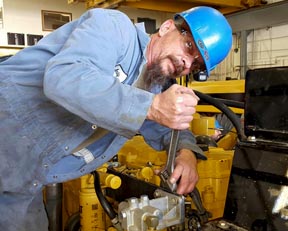Employment of diesel service technicians and mechanics is projected to grow by 12% from 2014 to 2024. Who will fill these positions? With the majority of our children aiming to earn Bachelor’s degrees in unrelated fields of study, who will be left to roll up their sleeves and turn wrenches? With the growing demand and better-than-average salaries of $50-65K plus, why aren’t we seeing more kids flock to this field?
Diesel mechanics have the opportunity to travel all over the world, meet a variety of people and experience new and interesting cultures. The skills individuals accrue as diesel mechanics apply to many aspects of life, making these professionals valuable assets, not only to their companies, but at home and within their communities. This career choice deserves more glory than it often receives, and should be held in higher regard in our education system. There are many career avenues for this specialized field, from mining and construction to wholesale distribution as well as small business ownership.
Incidentally, as we’re seeing fewer young people beginning their career paths in hands-on entry-levels positions that evolve based on experience, we’re also seeing a higher number of millennials entering the job market in management-level positions. What is the correlation? I think it’s simple. We are not placing the value we did in the past on starting at the bottom of the ladder and working your way up, one hard-earned rung at a time.
What happened to the days when everyone was expected to begin at the entry level, learn their trade and develop a knowledge base through experience, expand their role and responsibilities, and eventually move into a management position? Successfully leading a team means knowing the business inside and out, front to back – not because you were fast tracked through the company on the heels of your B.A. in Business Management. These years of experience in the industry mean really knowing how the guys on the floor feel when relegated to using antiquated tools, and taking the initiative to provide them with better mechanisms. You understand how the weather effects your drivers and share empathy for their long days because sometimes, that’s all it takes. You listen to your assembly team when they find a better way, because you once had felt pride in sharing new and improved ideas with your boss.
So many jobs today are labeled “dead end jobs”, thus keeping our kids from choosing them as a career. We are failing to educate our kids (as parents and teachers) on the importance of these fields. Mechanics, fabricators, assembly technicians – they are all a vital part of our economy.
Now, I’m partial because my son is a diesel mechanic. But I do follow the kids he grew up with. Many of them either quit college part of the way through or, if they do graduate, they end up with thousands of dollars in student debt and no practical experience to carry them forward into successful careers. There is a middle ground. Where is it?
